Health Psychology: Oral Health in Low Socioeconomic Groups
VerifiedAdded on 2021/05/30
|17
|4232
|273
Report
AI Summary
This report delves into the critical issue of poor oral health within low socioeconomic communities, examining the multifaceted factors that contribute to this disparity. It emphasizes that oral health is a vital component of overall health, highlighting the impact of oral diseases as indicators of general health deficiencies and systemic infections. The report explores the background of the problem, emphasizing the prevalence of oral health issues in disadvantaged groups and the barriers to accessing proper dental care, such as cost, health literacy, and cultural insensitivity. It justifies the need for this study by pointing out the deliberate progress in decreasing health disparities among poor populations and the importance of incorporating health psychology perspectives. The study proposes a strategic plan to promote health literacy and prevent oral health difficulties, involving health psychologists and other professionals. The methodology includes ethical considerations, data collection through interviews, and data analysis for triangulation. The report also addresses the impact of racism and other social determinants on oral health outcomes and emphasizes the need for culturally sensitive healthcare approaches. The report aims to provide a comprehensive understanding of the challenges and potential solutions to improve oral health in low socioeconomic groups.
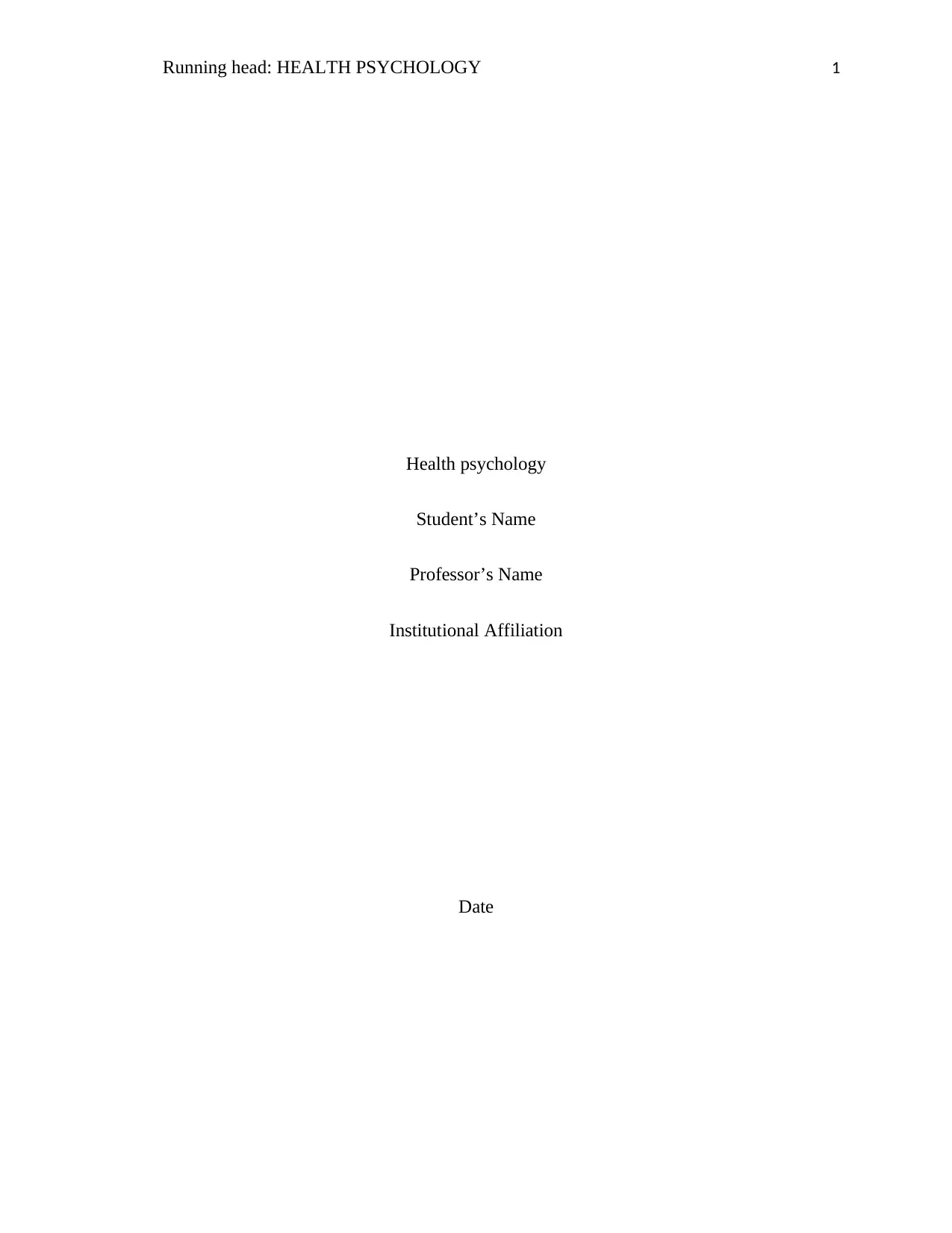
Running head: HEALTH PSYCHOLOGY 1
Health psychology
Student’s Name
Professor’s Name
Institutional Affiliation
Date
Health psychology
Student’s Name
Professor’s Name
Institutional Affiliation
Date
Paraphrase This Document
Need a fresh take? Get an instant paraphrase of this document with our AI Paraphraser
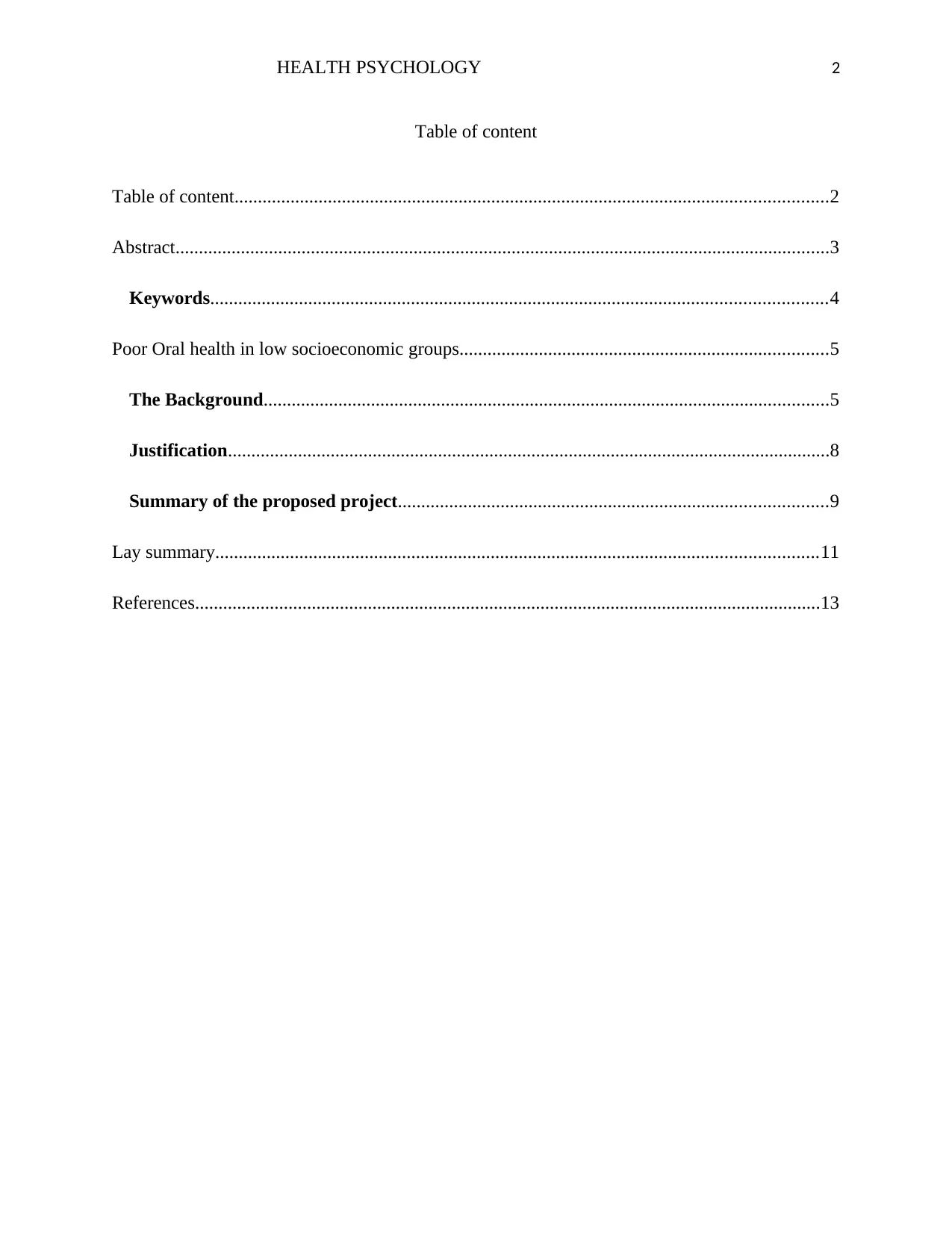
HEALTH PSYCHOLOGY 2
Table of content
Table of content...............................................................................................................................2
Abstract............................................................................................................................................3
Keywords....................................................................................................................................4
Poor Oral health in low socioeconomic groups...............................................................................5
The Background.........................................................................................................................5
Justification.................................................................................................................................8
Summary of the proposed project............................................................................................9
Lay summary.................................................................................................................................11
References......................................................................................................................................13
Table of content
Table of content...............................................................................................................................2
Abstract............................................................................................................................................3
Keywords....................................................................................................................................4
Poor Oral health in low socioeconomic groups...............................................................................5
The Background.........................................................................................................................5
Justification.................................................................................................................................8
Summary of the proposed project............................................................................................9
Lay summary.................................................................................................................................11
References......................................................................................................................................13
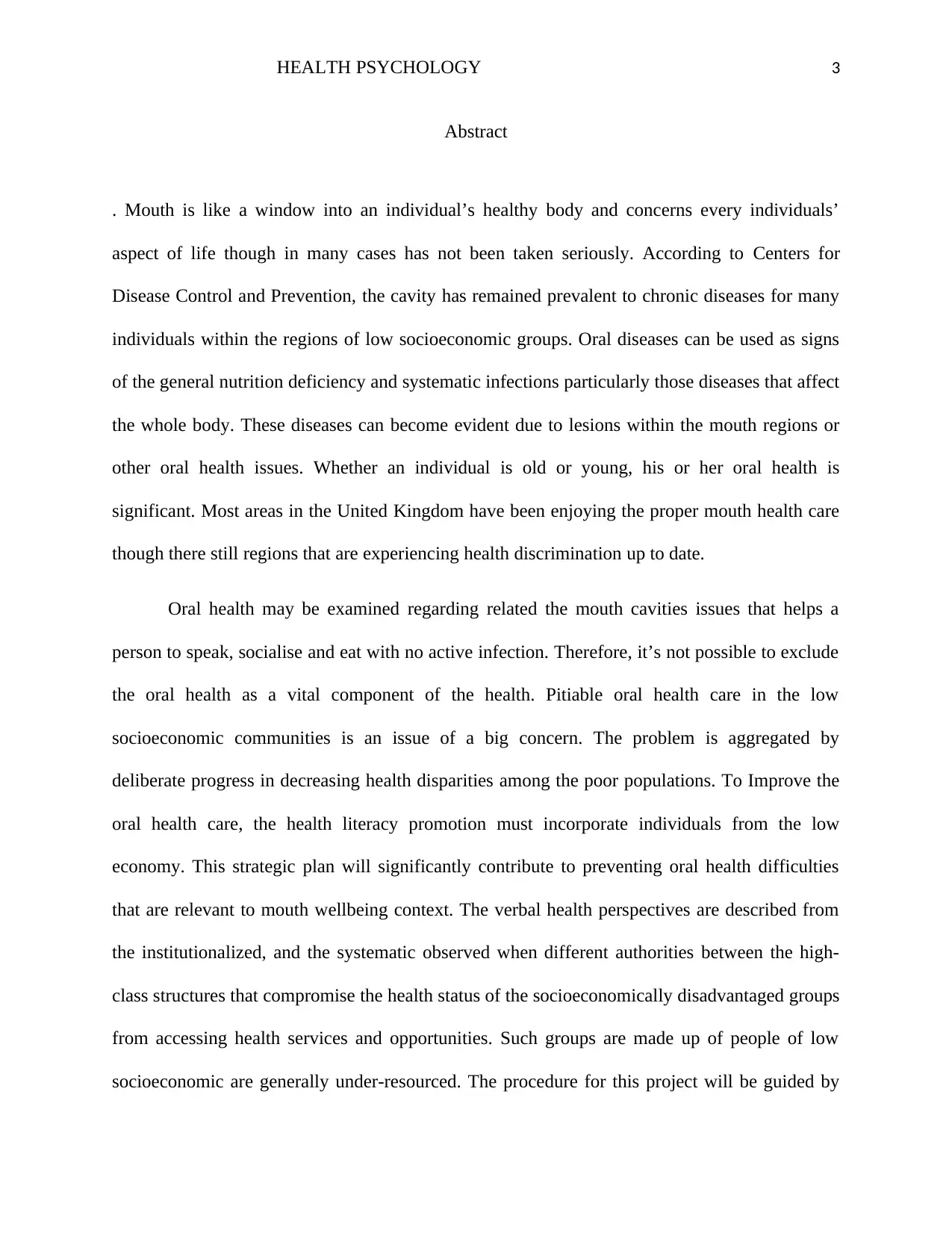
HEALTH PSYCHOLOGY 3
Abstract
. Mouth is like a window into an individual’s healthy body and concerns every individuals’
aspect of life though in many cases has not been taken seriously. According to Centers for
Disease Control and Prevention, the cavity has remained prevalent to chronic diseases for many
individuals within the regions of low socioeconomic groups. Oral diseases can be used as signs
of the general nutrition deficiency and systematic infections particularly those diseases that affect
the whole body. These diseases can become evident due to lesions within the mouth regions or
other oral health issues. Whether an individual is old or young, his or her oral health is
significant. Most areas in the United Kingdom have been enjoying the proper mouth health care
though there still regions that are experiencing health discrimination up to date.
Oral health may be examined regarding related the mouth cavities issues that helps a
person to speak, socialise and eat with no active infection. Therefore, it’s not possible to exclude
the oral health as a vital component of the health. Pitiable oral health care in the low
socioeconomic communities is an issue of a big concern. The problem is aggregated by
deliberate progress in decreasing health disparities among the poor populations. To Improve the
oral health care, the health literacy promotion must incorporate individuals from the low
economy. This strategic plan will significantly contribute to preventing oral health difficulties
that are relevant to mouth wellbeing context. The verbal health perspectives are described from
the institutionalized, and the systematic observed when different authorities between the high-
class structures that compromise the health status of the socioeconomically disadvantaged groups
from accessing health services and opportunities. Such groups are made up of people of low
socioeconomic are generally under-resourced. The procedure for this project will be guided by
Abstract
. Mouth is like a window into an individual’s healthy body and concerns every individuals’
aspect of life though in many cases has not been taken seriously. According to Centers for
Disease Control and Prevention, the cavity has remained prevalent to chronic diseases for many
individuals within the regions of low socioeconomic groups. Oral diseases can be used as signs
of the general nutrition deficiency and systematic infections particularly those diseases that affect
the whole body. These diseases can become evident due to lesions within the mouth regions or
other oral health issues. Whether an individual is old or young, his or her oral health is
significant. Most areas in the United Kingdom have been enjoying the proper mouth health care
though there still regions that are experiencing health discrimination up to date.
Oral health may be examined regarding related the mouth cavities issues that helps a
person to speak, socialise and eat with no active infection. Therefore, it’s not possible to exclude
the oral health as a vital component of the health. Pitiable oral health care in the low
socioeconomic communities is an issue of a big concern. The problem is aggregated by
deliberate progress in decreasing health disparities among the poor populations. To Improve the
oral health care, the health literacy promotion must incorporate individuals from the low
economy. This strategic plan will significantly contribute to preventing oral health difficulties
that are relevant to mouth wellbeing context. The verbal health perspectives are described from
the institutionalized, and the systematic observed when different authorities between the high-
class structures that compromise the health status of the socioeconomically disadvantaged groups
from accessing health services and opportunities. Such groups are made up of people of low
socioeconomic are generally under-resourced. The procedure for this project will be guided by
⊘ This is a preview!⊘
Do you want full access?
Subscribe today to unlock all pages.

Trusted by 1+ million students worldwide
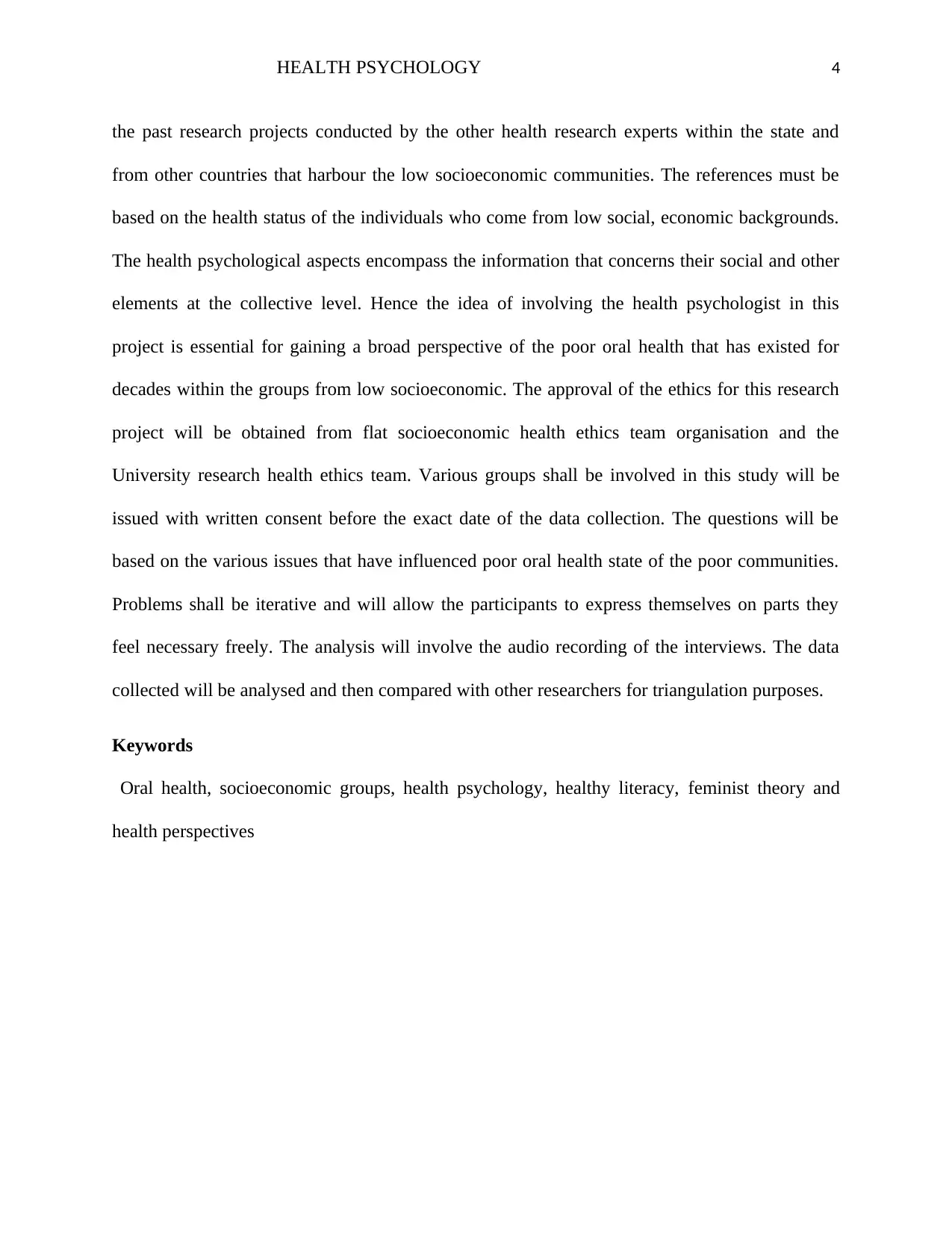
HEALTH PSYCHOLOGY 4
the past research projects conducted by the other health research experts within the state and
from other countries that harbour the low socioeconomic communities. The references must be
based on the health status of the individuals who come from low social, economic backgrounds.
The health psychological aspects encompass the information that concerns their social and other
elements at the collective level. Hence the idea of involving the health psychologist in this
project is essential for gaining a broad perspective of the poor oral health that has existed for
decades within the groups from low socioeconomic. The approval of the ethics for this research
project will be obtained from flat socioeconomic health ethics team organisation and the
University research health ethics team. Various groups shall be involved in this study will be
issued with written consent before the exact date of the data collection. The questions will be
based on the various issues that have influenced poor oral health state of the poor communities.
Problems shall be iterative and will allow the participants to express themselves on parts they
feel necessary freely. The analysis will involve the audio recording of the interviews. The data
collected will be analysed and then compared with other researchers for triangulation purposes.
Keywords
Oral health, socioeconomic groups, health psychology, healthy literacy, feminist theory and
health perspectives
the past research projects conducted by the other health research experts within the state and
from other countries that harbour the low socioeconomic communities. The references must be
based on the health status of the individuals who come from low social, economic backgrounds.
The health psychological aspects encompass the information that concerns their social and other
elements at the collective level. Hence the idea of involving the health psychologist in this
project is essential for gaining a broad perspective of the poor oral health that has existed for
decades within the groups from low socioeconomic. The approval of the ethics for this research
project will be obtained from flat socioeconomic health ethics team organisation and the
University research health ethics team. Various groups shall be involved in this study will be
issued with written consent before the exact date of the data collection. The questions will be
based on the various issues that have influenced poor oral health state of the poor communities.
Problems shall be iterative and will allow the participants to express themselves on parts they
feel necessary freely. The analysis will involve the audio recording of the interviews. The data
collected will be analysed and then compared with other researchers for triangulation purposes.
Keywords
Oral health, socioeconomic groups, health psychology, healthy literacy, feminist theory and
health perspectives
Paraphrase This Document
Need a fresh take? Get an instant paraphrase of this document with our AI Paraphraser
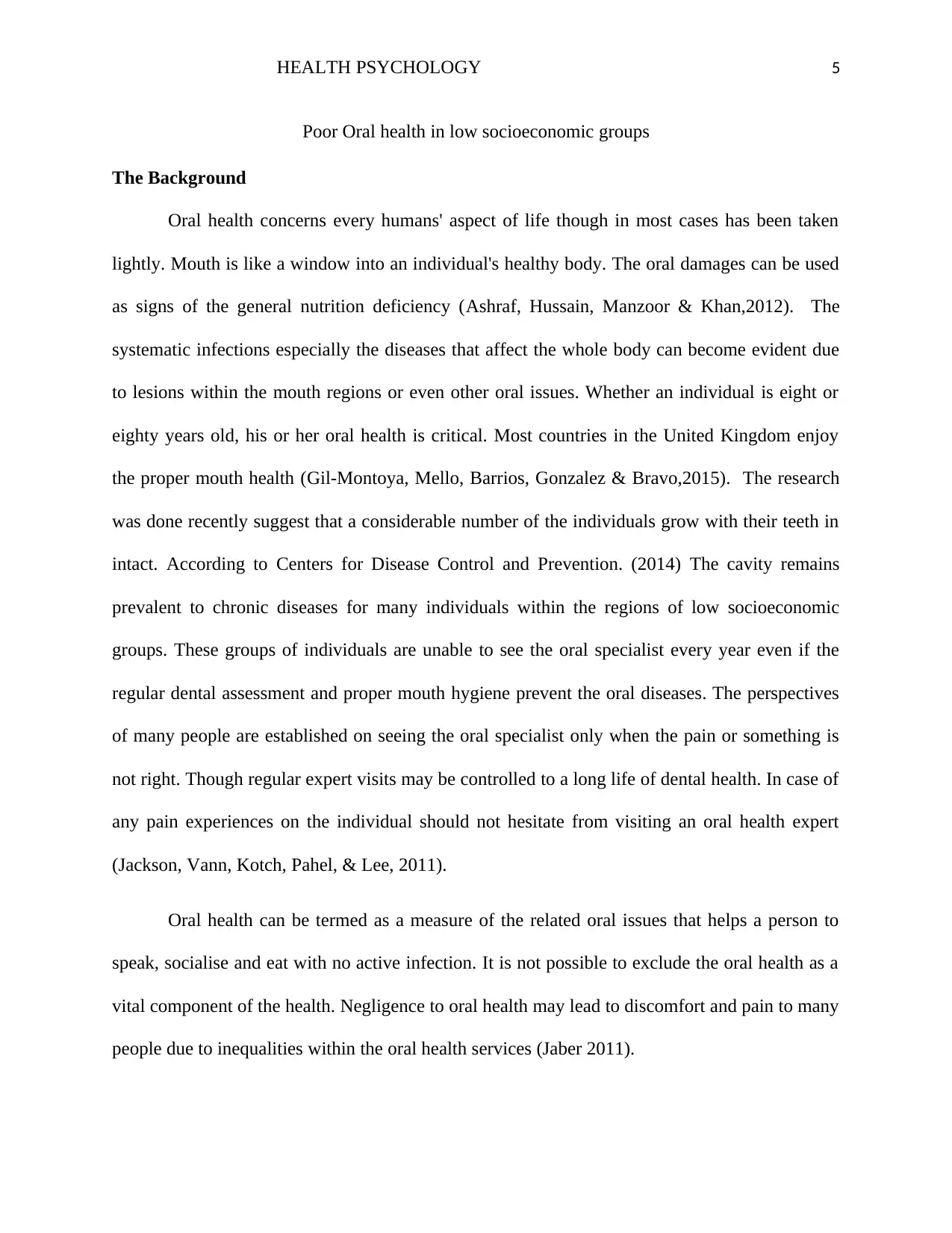
HEALTH PSYCHOLOGY 5
Poor Oral health in low socioeconomic groups
The Background
Oral health concerns every humans' aspect of life though in most cases has been taken
lightly. Mouth is like a window into an individual's healthy body. The oral damages can be used
as signs of the general nutrition deficiency (Ashraf, Hussain, Manzoor & Khan,2012). The
systematic infections especially the diseases that affect the whole body can become evident due
to lesions within the mouth regions or even other oral issues. Whether an individual is eight or
eighty years old, his or her oral health is critical. Most countries in the United Kingdom enjoy
the proper mouth health (Gil-Montoya, Mello, Barrios, Gonzalez & Bravo,2015). The research
was done recently suggest that a considerable number of the individuals grow with their teeth in
intact. According to Centers for Disease Control and Prevention. (2014) The cavity remains
prevalent to chronic diseases for many individuals within the regions of low socioeconomic
groups. These groups of individuals are unable to see the oral specialist every year even if the
regular dental assessment and proper mouth hygiene prevent the oral diseases. The perspectives
of many people are established on seeing the oral specialist only when the pain or something is
not right. Though regular expert visits may be controlled to a long life of dental health. In case of
any pain experiences on the individual should not hesitate from visiting an oral health expert
(Jackson, Vann, Kotch, Pahel, & Lee, 2011).
Oral health can be termed as a measure of the related oral issues that helps a person to
speak, socialise and eat with no active infection. It is not possible to exclude the oral health as a
vital component of the health. Negligence to oral health may lead to discomfort and pain to many
people due to inequalities within the oral health services (Jaber 2011).
Poor Oral health in low socioeconomic groups
The Background
Oral health concerns every humans' aspect of life though in most cases has been taken
lightly. Mouth is like a window into an individual's healthy body. The oral damages can be used
as signs of the general nutrition deficiency (Ashraf, Hussain, Manzoor & Khan,2012). The
systematic infections especially the diseases that affect the whole body can become evident due
to lesions within the mouth regions or even other oral issues. Whether an individual is eight or
eighty years old, his or her oral health is critical. Most countries in the United Kingdom enjoy
the proper mouth health (Gil-Montoya, Mello, Barrios, Gonzalez & Bravo,2015). The research
was done recently suggest that a considerable number of the individuals grow with their teeth in
intact. According to Centers for Disease Control and Prevention. (2014) The cavity remains
prevalent to chronic diseases for many individuals within the regions of low socioeconomic
groups. These groups of individuals are unable to see the oral specialist every year even if the
regular dental assessment and proper mouth hygiene prevent the oral diseases. The perspectives
of many people are established on seeing the oral specialist only when the pain or something is
not right. Though regular expert visits may be controlled to a long life of dental health. In case of
any pain experiences on the individual should not hesitate from visiting an oral health expert
(Jackson, Vann, Kotch, Pahel, & Lee, 2011).
Oral health can be termed as a measure of the related oral issues that helps a person to
speak, socialise and eat with no active infection. It is not possible to exclude the oral health as a
vital component of the health. Negligence to oral health may lead to discomfort and pain to many
people due to inequalities within the oral health services (Jaber 2011).
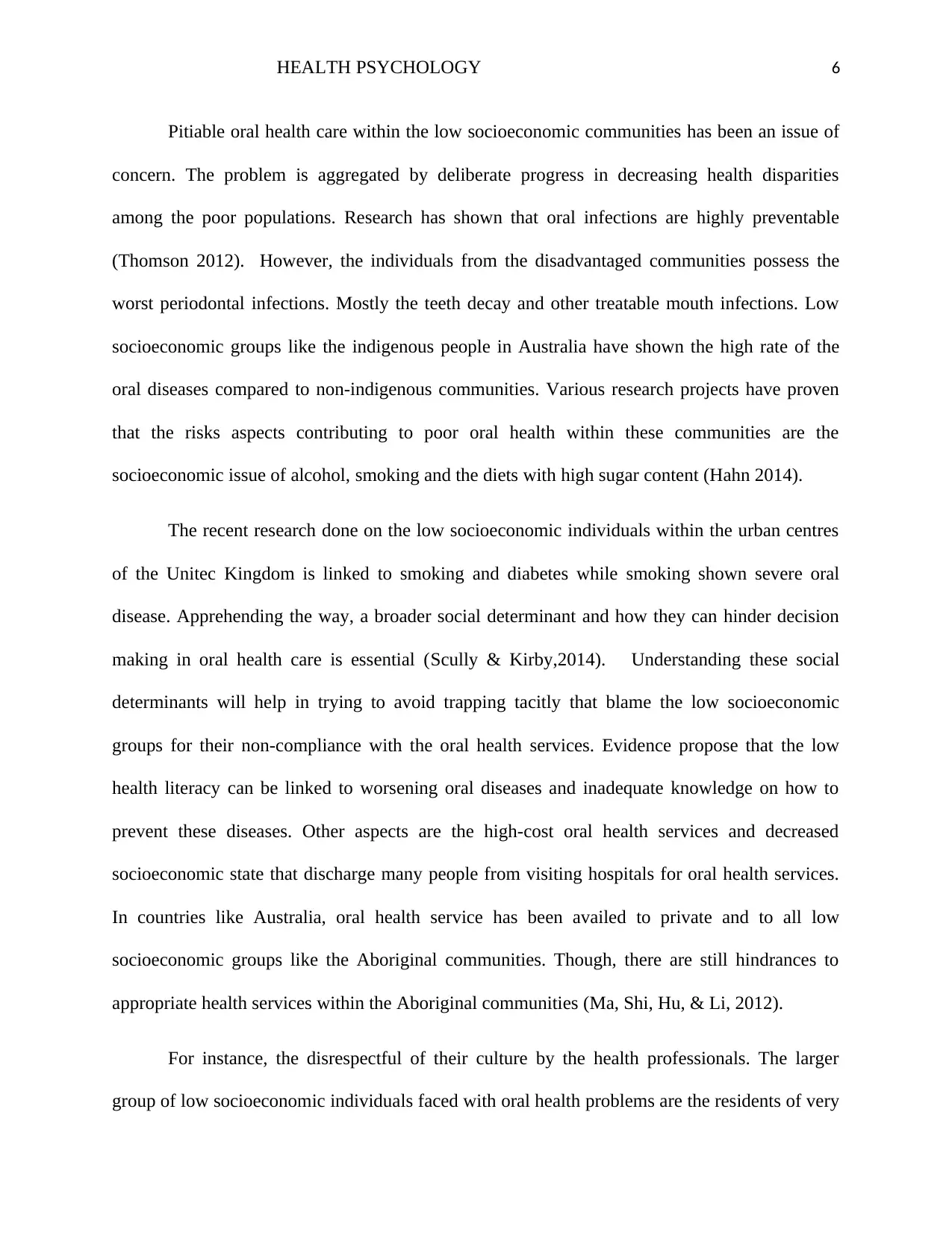
HEALTH PSYCHOLOGY 6
Pitiable oral health care within the low socioeconomic communities has been an issue of
concern. The problem is aggregated by deliberate progress in decreasing health disparities
among the poor populations. Research has shown that oral infections are highly preventable
(Thomson 2012). However, the individuals from the disadvantaged communities possess the
worst periodontal infections. Mostly the teeth decay and other treatable mouth infections. Low
socioeconomic groups like the indigenous people in Australia have shown the high rate of the
oral diseases compared to non-indigenous communities. Various research projects have proven
that the risks aspects contributing to poor oral health within these communities are the
socioeconomic issue of alcohol, smoking and the diets with high sugar content (Hahn 2014).
The recent research done on the low socioeconomic individuals within the urban centres
of the Unitec Kingdom is linked to smoking and diabetes while smoking shown severe oral
disease. Apprehending the way, a broader social determinant and how they can hinder decision
making in oral health care is essential (Scully & Kirby,2014). Understanding these social
determinants will help in trying to avoid trapping tacitly that blame the low socioeconomic
groups for their non-compliance with the oral health services. Evidence propose that the low
health literacy can be linked to worsening oral diseases and inadequate knowledge on how to
prevent these diseases. Other aspects are the high-cost oral health services and decreased
socioeconomic state that discharge many people from visiting hospitals for oral health services.
In countries like Australia, oral health service has been availed to private and to all low
socioeconomic groups like the Aboriginal communities. Though, there are still hindrances to
appropriate health services within the Aboriginal communities (Ma, Shi, Hu, & Li, 2012).
For instance, the disrespectful of their culture by the health professionals. The larger
group of low socioeconomic individuals faced with oral health problems are the residents of very
Pitiable oral health care within the low socioeconomic communities has been an issue of
concern. The problem is aggregated by deliberate progress in decreasing health disparities
among the poor populations. Research has shown that oral infections are highly preventable
(Thomson 2012). However, the individuals from the disadvantaged communities possess the
worst periodontal infections. Mostly the teeth decay and other treatable mouth infections. Low
socioeconomic groups like the indigenous people in Australia have shown the high rate of the
oral diseases compared to non-indigenous communities. Various research projects have proven
that the risks aspects contributing to poor oral health within these communities are the
socioeconomic issue of alcohol, smoking and the diets with high sugar content (Hahn 2014).
The recent research done on the low socioeconomic individuals within the urban centres
of the Unitec Kingdom is linked to smoking and diabetes while smoking shown severe oral
disease. Apprehending the way, a broader social determinant and how they can hinder decision
making in oral health care is essential (Scully & Kirby,2014). Understanding these social
determinants will help in trying to avoid trapping tacitly that blame the low socioeconomic
groups for their non-compliance with the oral health services. Evidence propose that the low
health literacy can be linked to worsening oral diseases and inadequate knowledge on how to
prevent these diseases. Other aspects are the high-cost oral health services and decreased
socioeconomic state that discharge many people from visiting hospitals for oral health services.
In countries like Australia, oral health service has been availed to private and to all low
socioeconomic groups like the Aboriginal communities. Though, there are still hindrances to
appropriate health services within the Aboriginal communities (Ma, Shi, Hu, & Li, 2012).
For instance, the disrespectful of their culture by the health professionals. The larger
group of low socioeconomic individuals faced with oral health problems are the residents of very
⊘ This is a preview!⊘
Do you want full access?
Subscribe today to unlock all pages.

Trusted by 1+ million students worldwide
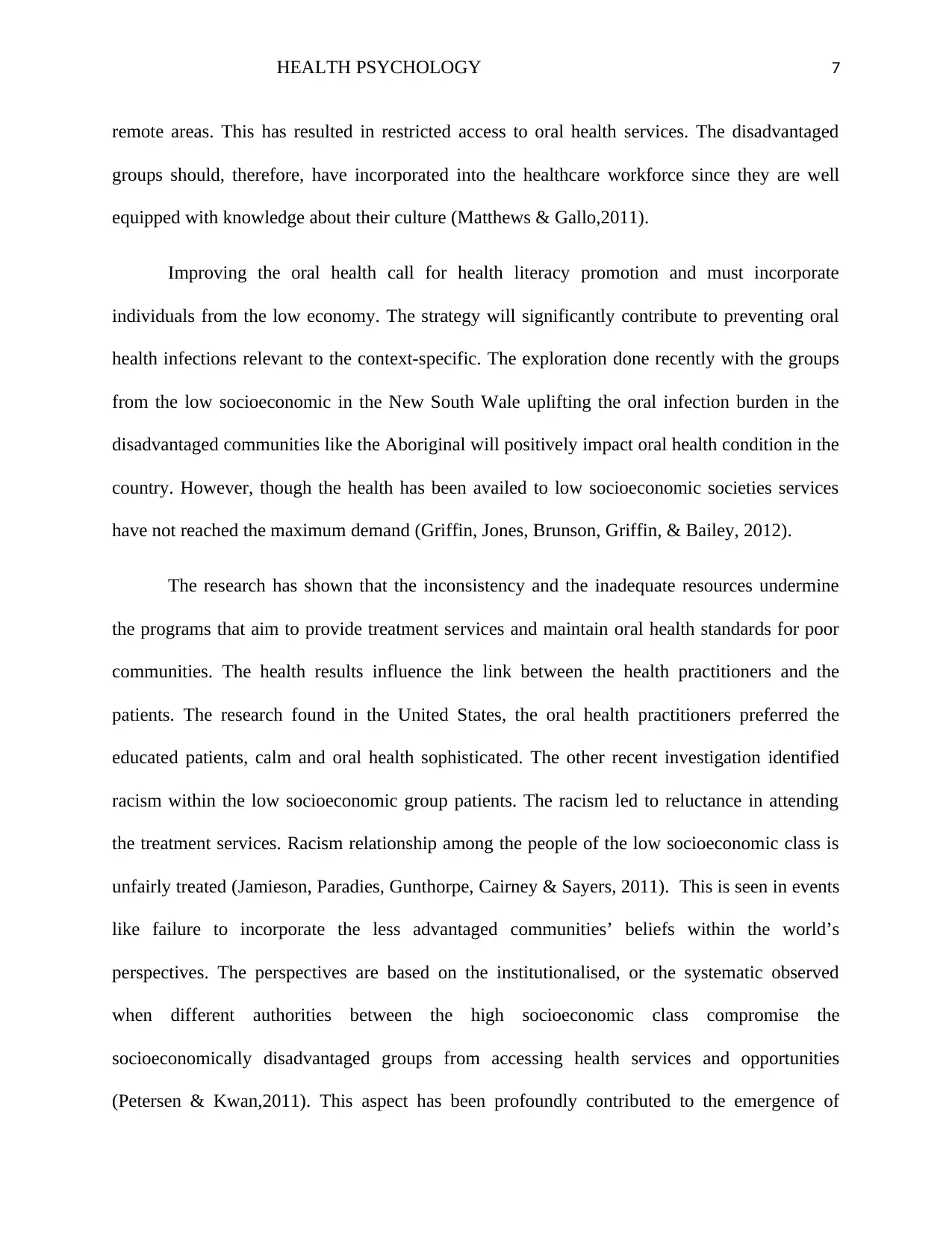
HEALTH PSYCHOLOGY 7
remote areas. This has resulted in restricted access to oral health services. The disadvantaged
groups should, therefore, have incorporated into the healthcare workforce since they are well
equipped with knowledge about their culture (Matthews & Gallo,2011).
Improving the oral health call for health literacy promotion and must incorporate
individuals from the low economy. The strategy will significantly contribute to preventing oral
health infections relevant to the context-specific. The exploration done recently with the groups
from the low socioeconomic in the New South Wale uplifting the oral infection burden in the
disadvantaged communities like the Aboriginal will positively impact oral health condition in the
country. However, though the health has been availed to low socioeconomic societies services
have not reached the maximum demand (Griffin, Jones, Brunson, Griffin, & Bailey, 2012).
The research has shown that the inconsistency and the inadequate resources undermine
the programs that aim to provide treatment services and maintain oral health standards for poor
communities. The health results influence the link between the health practitioners and the
patients. The research found in the United States, the oral health practitioners preferred the
educated patients, calm and oral health sophisticated. The other recent investigation identified
racism within the low socioeconomic group patients. The racism led to reluctance in attending
the treatment services. Racism relationship among the people of the low socioeconomic class is
unfairly treated (Jamieson, Paradies, Gunthorpe, Cairney & Sayers, 2011). This is seen in events
like failure to incorporate the less advantaged communities’ beliefs within the world’s
perspectives. The perspectives are based on the institutionalised, or the systematic observed
when different authorities between the high socioeconomic class compromise the
socioeconomically disadvantaged groups from accessing health services and opportunities
(Petersen & Kwan,2011). This aspect has been profoundly contributed to the emergence of
remote areas. This has resulted in restricted access to oral health services. The disadvantaged
groups should, therefore, have incorporated into the healthcare workforce since they are well
equipped with knowledge about their culture (Matthews & Gallo,2011).
Improving the oral health call for health literacy promotion and must incorporate
individuals from the low economy. The strategy will significantly contribute to preventing oral
health infections relevant to the context-specific. The exploration done recently with the groups
from the low socioeconomic in the New South Wale uplifting the oral infection burden in the
disadvantaged communities like the Aboriginal will positively impact oral health condition in the
country. However, though the health has been availed to low socioeconomic societies services
have not reached the maximum demand (Griffin, Jones, Brunson, Griffin, & Bailey, 2012).
The research has shown that the inconsistency and the inadequate resources undermine
the programs that aim to provide treatment services and maintain oral health standards for poor
communities. The health results influence the link between the health practitioners and the
patients. The research found in the United States, the oral health practitioners preferred the
educated patients, calm and oral health sophisticated. The other recent investigation identified
racism within the low socioeconomic group patients. The racism led to reluctance in attending
the treatment services. Racism relationship among the people of the low socioeconomic class is
unfairly treated (Jamieson, Paradies, Gunthorpe, Cairney & Sayers, 2011). This is seen in events
like failure to incorporate the less advantaged communities’ beliefs within the world’s
perspectives. The perspectives are based on the institutionalised, or the systematic observed
when different authorities between the high socioeconomic class compromise the
socioeconomically disadvantaged groups from accessing health services and opportunities
(Petersen & Kwan,2011). This aspect has been profoundly contributed to the emergence of
Paraphrase This Document
Need a fresh take? Get an instant paraphrase of this document with our AI Paraphraser
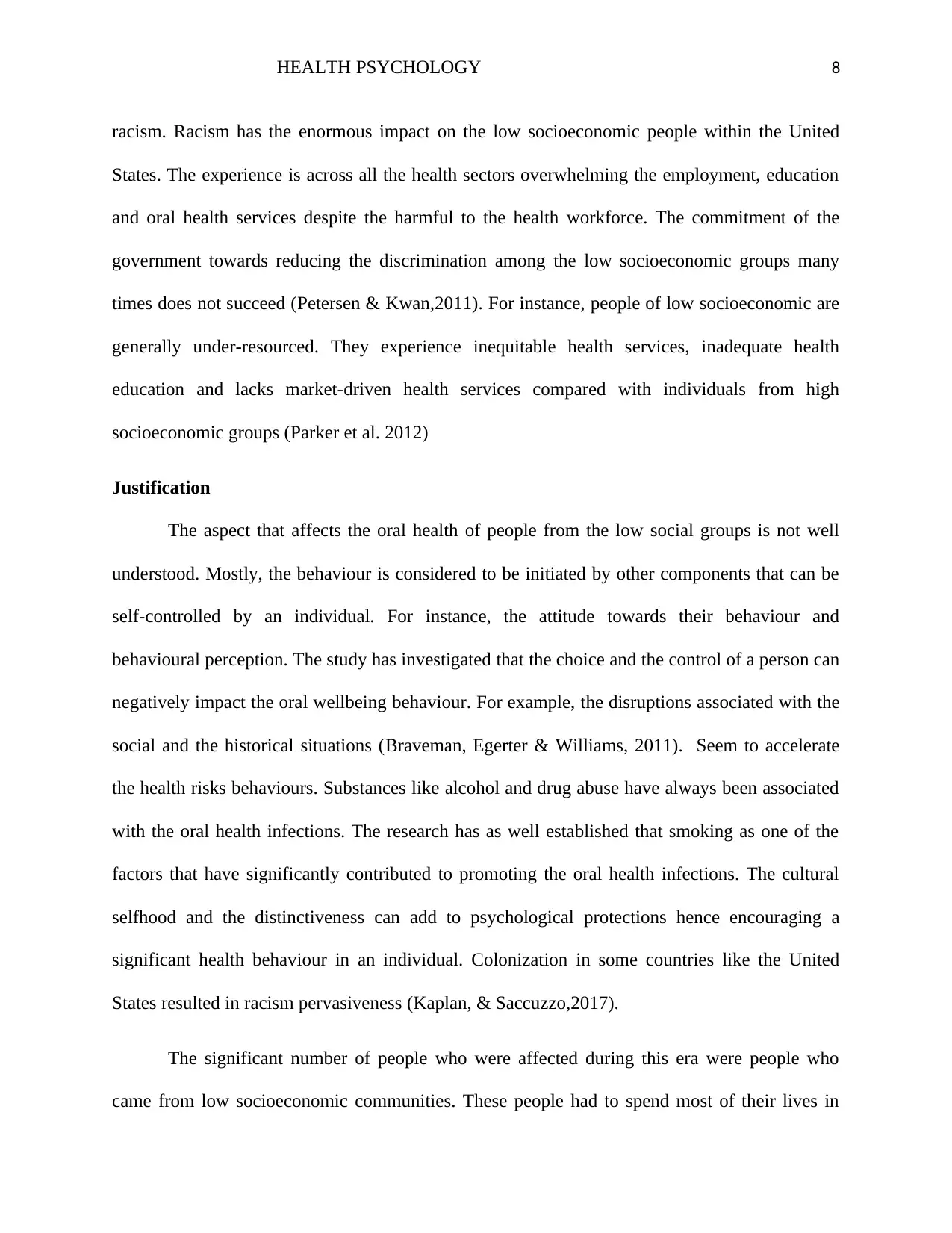
HEALTH PSYCHOLOGY 8
racism. Racism has the enormous impact on the low socioeconomic people within the United
States. The experience is across all the health sectors overwhelming the employment, education
and oral health services despite the harmful to the health workforce. The commitment of the
government towards reducing the discrimination among the low socioeconomic groups many
times does not succeed (Petersen & Kwan,2011). For instance, people of low socioeconomic are
generally under-resourced. They experience inequitable health services, inadequate health
education and lacks market-driven health services compared with individuals from high
socioeconomic groups (Parker et al. 2012)
Justification
The aspect that affects the oral health of people from the low social groups is not well
understood. Mostly, the behaviour is considered to be initiated by other components that can be
self-controlled by an individual. For instance, the attitude towards their behaviour and
behavioural perception. The study has investigated that the choice and the control of a person can
negatively impact the oral wellbeing behaviour. For example, the disruptions associated with the
social and the historical situations (Braveman, Egerter & Williams, 2011). Seem to accelerate
the health risks behaviours. Substances like alcohol and drug abuse have always been associated
with the oral health infections. The research has as well established that smoking as one of the
factors that have significantly contributed to promoting the oral health infections. The cultural
selfhood and the distinctiveness can add to psychological protections hence encouraging a
significant health behaviour in an individual. Colonization in some countries like the United
States resulted in racism pervasiveness (Kaplan, & Saccuzzo,2017).
The significant number of people who were affected during this era were people who
came from low socioeconomic communities. These people had to spend most of their lives in
racism. Racism has the enormous impact on the low socioeconomic people within the United
States. The experience is across all the health sectors overwhelming the employment, education
and oral health services despite the harmful to the health workforce. The commitment of the
government towards reducing the discrimination among the low socioeconomic groups many
times does not succeed (Petersen & Kwan,2011). For instance, people of low socioeconomic are
generally under-resourced. They experience inequitable health services, inadequate health
education and lacks market-driven health services compared with individuals from high
socioeconomic groups (Parker et al. 2012)
Justification
The aspect that affects the oral health of people from the low social groups is not well
understood. Mostly, the behaviour is considered to be initiated by other components that can be
self-controlled by an individual. For instance, the attitude towards their behaviour and
behavioural perception. The study has investigated that the choice and the control of a person can
negatively impact the oral wellbeing behaviour. For example, the disruptions associated with the
social and the historical situations (Braveman, Egerter & Williams, 2011). Seem to accelerate
the health risks behaviours. Substances like alcohol and drug abuse have always been associated
with the oral health infections. The research has as well established that smoking as one of the
factors that have significantly contributed to promoting the oral health infections. The cultural
selfhood and the distinctiveness can add to psychological protections hence encouraging a
significant health behaviour in an individual. Colonization in some countries like the United
States resulted in racism pervasiveness (Kaplan, & Saccuzzo,2017).
The significant number of people who were affected during this era were people who
came from low socioeconomic communities. These people had to spend most of their lives in
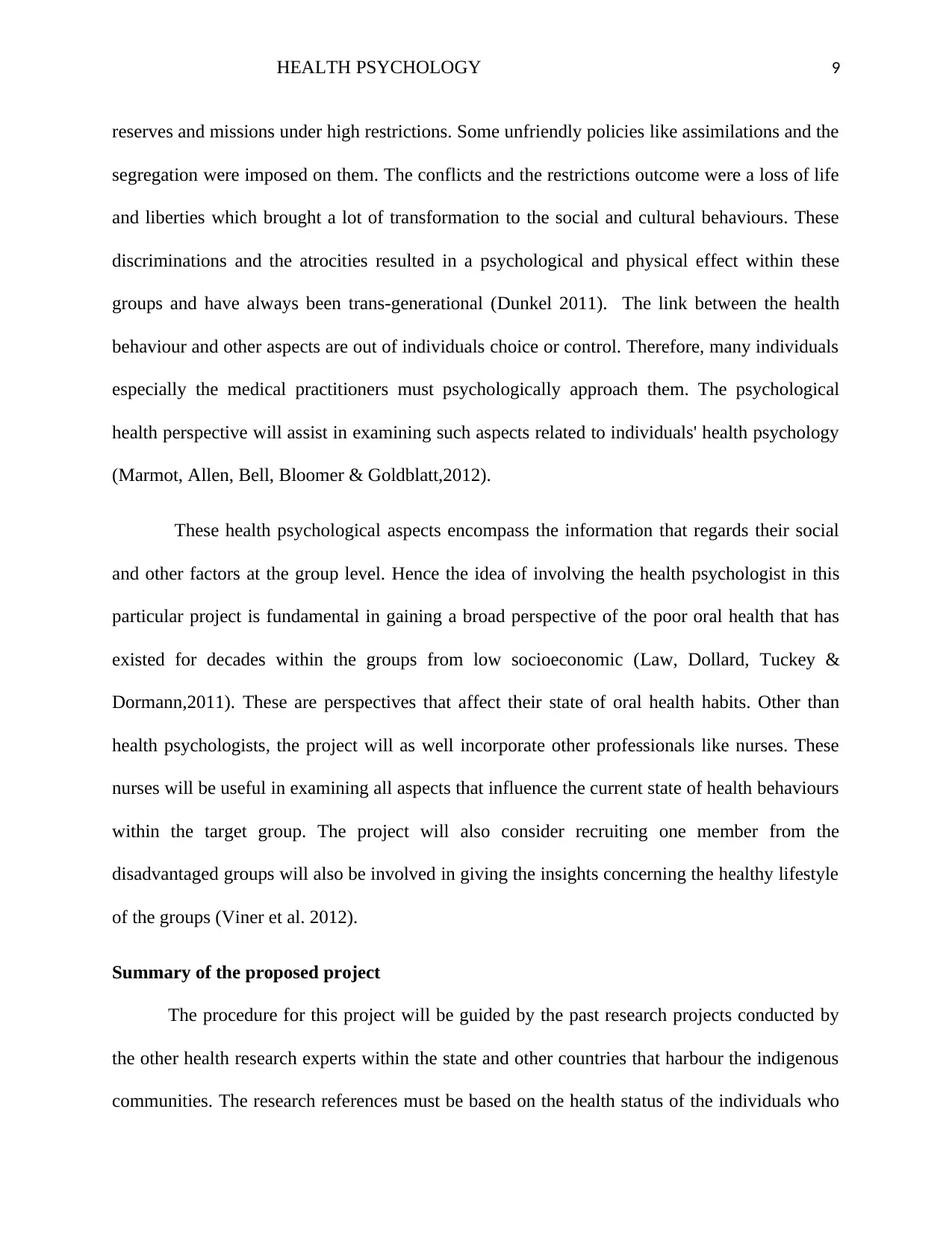
HEALTH PSYCHOLOGY 9
reserves and missions under high restrictions. Some unfriendly policies like assimilations and the
segregation were imposed on them. The conflicts and the restrictions outcome were a loss of life
and liberties which brought a lot of transformation to the social and cultural behaviours. These
discriminations and the atrocities resulted in a psychological and physical effect within these
groups and have always been trans-generational (Dunkel 2011). The link between the health
behaviour and other aspects are out of individuals choice or control. Therefore, many individuals
especially the medical practitioners must psychologically approach them. The psychological
health perspective will assist in examining such aspects related to individuals' health psychology
(Marmot, Allen, Bell, Bloomer & Goldblatt,2012).
These health psychological aspects encompass the information that regards their social
and other factors at the group level. Hence the idea of involving the health psychologist in this
particular project is fundamental in gaining a broad perspective of the poor oral health that has
existed for decades within the groups from low socioeconomic (Law, Dollard, Tuckey &
Dormann,2011). These are perspectives that affect their state of oral health habits. Other than
health psychologists, the project will as well incorporate other professionals like nurses. These
nurses will be useful in examining all aspects that influence the current state of health behaviours
within the target group. The project will also consider recruiting one member from the
disadvantaged groups will also be involved in giving the insights concerning the healthy lifestyle
of the groups (Viner et al. 2012).
Summary of the proposed project
The procedure for this project will be guided by the past research projects conducted by
the other health research experts within the state and other countries that harbour the indigenous
communities. The research references must be based on the health status of the individuals who
reserves and missions under high restrictions. Some unfriendly policies like assimilations and the
segregation were imposed on them. The conflicts and the restrictions outcome were a loss of life
and liberties which brought a lot of transformation to the social and cultural behaviours. These
discriminations and the atrocities resulted in a psychological and physical effect within these
groups and have always been trans-generational (Dunkel 2011). The link between the health
behaviour and other aspects are out of individuals choice or control. Therefore, many individuals
especially the medical practitioners must psychologically approach them. The psychological
health perspective will assist in examining such aspects related to individuals' health psychology
(Marmot, Allen, Bell, Bloomer & Goldblatt,2012).
These health psychological aspects encompass the information that regards their social
and other factors at the group level. Hence the idea of involving the health psychologist in this
particular project is fundamental in gaining a broad perspective of the poor oral health that has
existed for decades within the groups from low socioeconomic (Law, Dollard, Tuckey &
Dormann,2011). These are perspectives that affect their state of oral health habits. Other than
health psychologists, the project will as well incorporate other professionals like nurses. These
nurses will be useful in examining all aspects that influence the current state of health behaviours
within the target group. The project will also consider recruiting one member from the
disadvantaged groups will also be involved in giving the insights concerning the healthy lifestyle
of the groups (Viner et al. 2012).
Summary of the proposed project
The procedure for this project will be guided by the past research projects conducted by
the other health research experts within the state and other countries that harbour the indigenous
communities. The research references must be based on the health status of the individuals who
⊘ This is a preview!⊘
Do you want full access?
Subscribe today to unlock all pages.

Trusted by 1+ million students worldwide
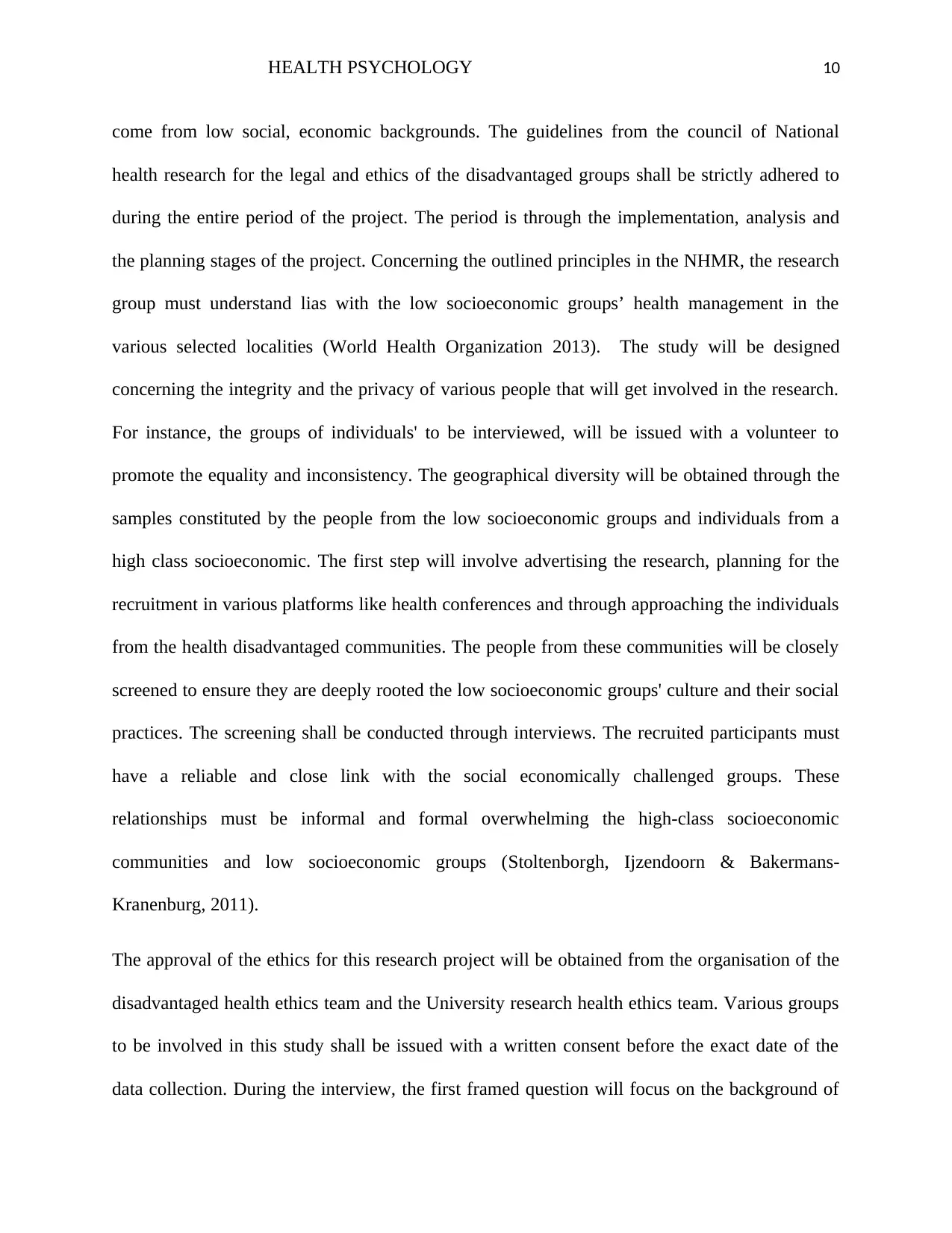
HEALTH PSYCHOLOGY 10
come from low social, economic backgrounds. The guidelines from the council of National
health research for the legal and ethics of the disadvantaged groups shall be strictly adhered to
during the entire period of the project. The period is through the implementation, analysis and
the planning stages of the project. Concerning the outlined principles in the NHMR, the research
group must understand lias with the low socioeconomic groups’ health management in the
various selected localities (World Health Organization 2013). The study will be designed
concerning the integrity and the privacy of various people that will get involved in the research.
For instance, the groups of individuals' to be interviewed, will be issued with a volunteer to
promote the equality and inconsistency. The geographical diversity will be obtained through the
samples constituted by the people from the low socioeconomic groups and individuals from a
high class socioeconomic. The first step will involve advertising the research, planning for the
recruitment in various platforms like health conferences and through approaching the individuals
from the health disadvantaged communities. The people from these communities will be closely
screened to ensure they are deeply rooted the low socioeconomic groups' culture and their social
practices. The screening shall be conducted through interviews. The recruited participants must
have a reliable and close link with the social economically challenged groups. These
relationships must be informal and formal overwhelming the high-class socioeconomic
communities and low socioeconomic groups (Stoltenborgh, Ijzendoorn & Bakermans-
Kranenburg, 2011).
The approval of the ethics for this research project will be obtained from the organisation of the
disadvantaged health ethics team and the University research health ethics team. Various groups
to be involved in this study shall be issued with a written consent before the exact date of the
data collection. During the interview, the first framed question will focus on the background of
come from low social, economic backgrounds. The guidelines from the council of National
health research for the legal and ethics of the disadvantaged groups shall be strictly adhered to
during the entire period of the project. The period is through the implementation, analysis and
the planning stages of the project. Concerning the outlined principles in the NHMR, the research
group must understand lias with the low socioeconomic groups’ health management in the
various selected localities (World Health Organization 2013). The study will be designed
concerning the integrity and the privacy of various people that will get involved in the research.
For instance, the groups of individuals' to be interviewed, will be issued with a volunteer to
promote the equality and inconsistency. The geographical diversity will be obtained through the
samples constituted by the people from the low socioeconomic groups and individuals from a
high class socioeconomic. The first step will involve advertising the research, planning for the
recruitment in various platforms like health conferences and through approaching the individuals
from the health disadvantaged communities. The people from these communities will be closely
screened to ensure they are deeply rooted the low socioeconomic groups' culture and their social
practices. The screening shall be conducted through interviews. The recruited participants must
have a reliable and close link with the social economically challenged groups. These
relationships must be informal and formal overwhelming the high-class socioeconomic
communities and low socioeconomic groups (Stoltenborgh, Ijzendoorn & Bakermans-
Kranenburg, 2011).
The approval of the ethics for this research project will be obtained from the organisation of the
disadvantaged health ethics team and the University research health ethics team. Various groups
to be involved in this study shall be issued with a written consent before the exact date of the
data collection. During the interview, the first framed question will focus on the background of
Paraphrase This Document
Need a fresh take? Get an instant paraphrase of this document with our AI Paraphraser
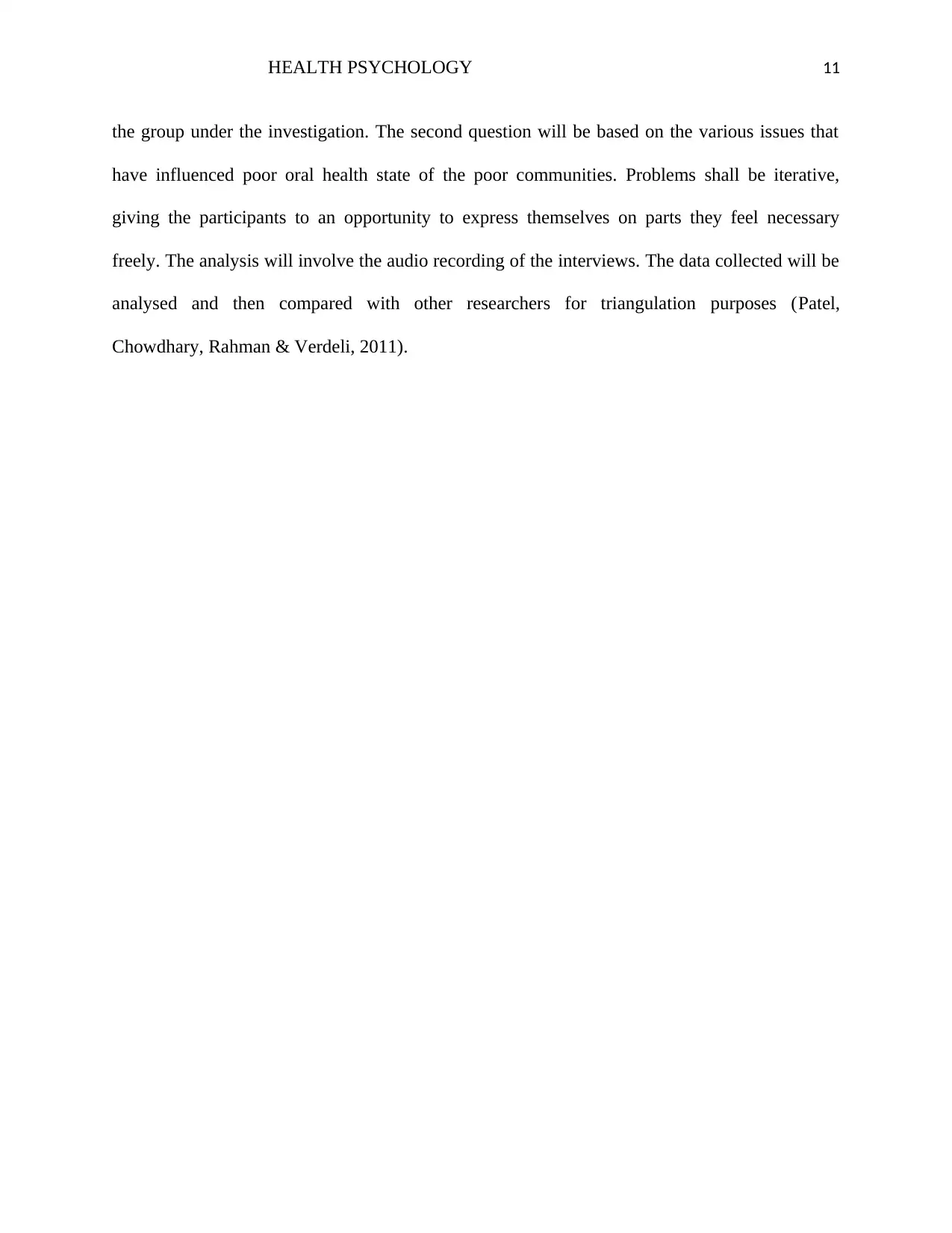
HEALTH PSYCHOLOGY 11
the group under the investigation. The second question will be based on the various issues that
have influenced poor oral health state of the poor communities. Problems shall be iterative,
giving the participants to an opportunity to express themselves on parts they feel necessary
freely. The analysis will involve the audio recording of the interviews. The data collected will be
analysed and then compared with other researchers for triangulation purposes (Patel,
Chowdhary, Rahman & Verdeli, 2011).
the group under the investigation. The second question will be based on the various issues that
have influenced poor oral health state of the poor communities. Problems shall be iterative,
giving the participants to an opportunity to express themselves on parts they feel necessary
freely. The analysis will involve the audio recording of the interviews. The data collected will be
analysed and then compared with other researchers for triangulation purposes (Patel,
Chowdhary, Rahman & Verdeli, 2011).
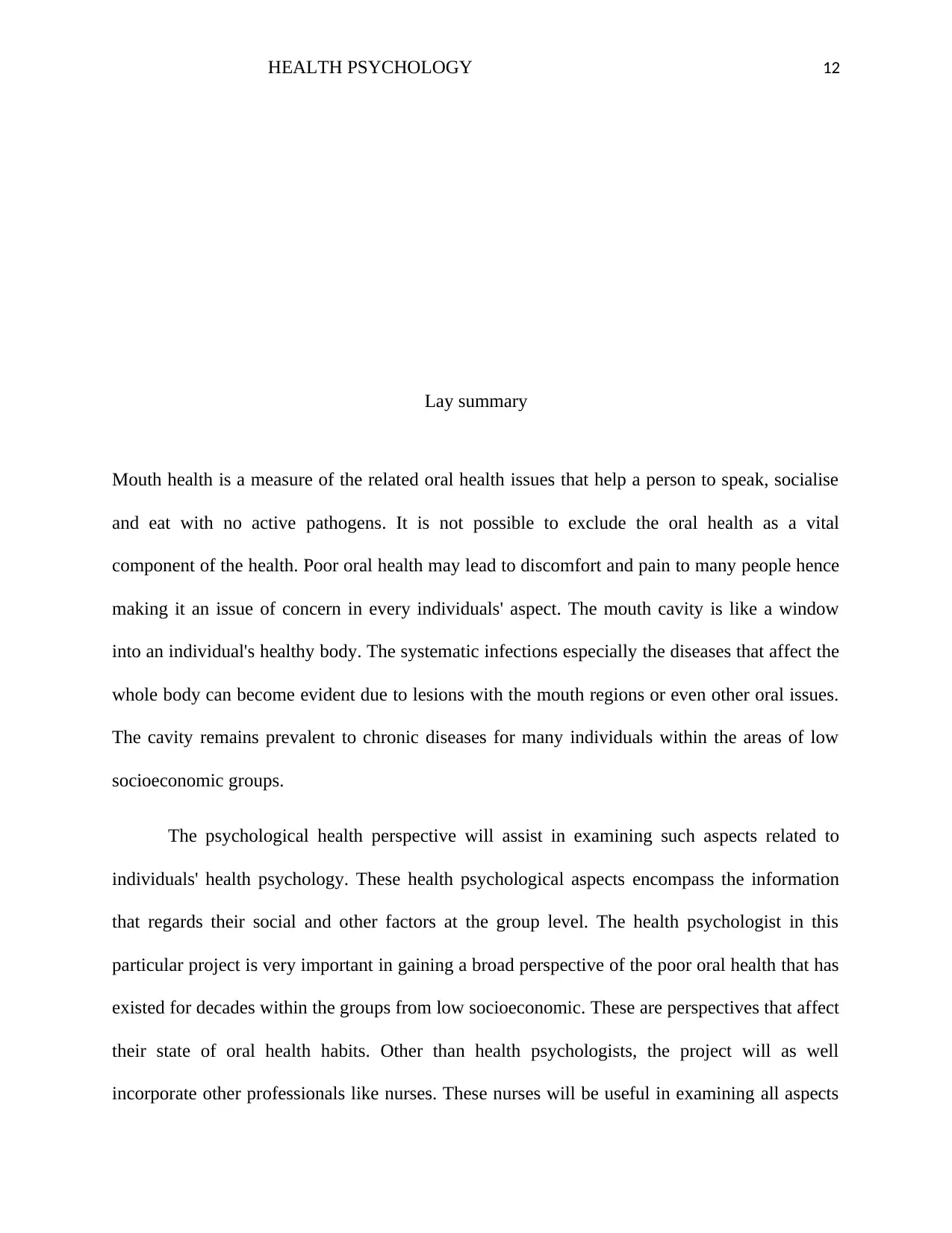
HEALTH PSYCHOLOGY 12
Lay summary
Mouth health is a measure of the related oral health issues that help a person to speak, socialise
and eat with no active pathogens. It is not possible to exclude the oral health as a vital
component of the health. Poor oral health may lead to discomfort and pain to many people hence
making it an issue of concern in every individuals' aspect. The mouth cavity is like a window
into an individual's healthy body. The systematic infections especially the diseases that affect the
whole body can become evident due to lesions with the mouth regions or even other oral issues.
The cavity remains prevalent to chronic diseases for many individuals within the areas of low
socioeconomic groups.
The psychological health perspective will assist in examining such aspects related to
individuals' health psychology. These health psychological aspects encompass the information
that regards their social and other factors at the group level. The health psychologist in this
particular project is very important in gaining a broad perspective of the poor oral health that has
existed for decades within the groups from low socioeconomic. These are perspectives that affect
their state of oral health habits. Other than health psychologists, the project will as well
incorporate other professionals like nurses. These nurses will be useful in examining all aspects
Lay summary
Mouth health is a measure of the related oral health issues that help a person to speak, socialise
and eat with no active pathogens. It is not possible to exclude the oral health as a vital
component of the health. Poor oral health may lead to discomfort and pain to many people hence
making it an issue of concern in every individuals' aspect. The mouth cavity is like a window
into an individual's healthy body. The systematic infections especially the diseases that affect the
whole body can become evident due to lesions with the mouth regions or even other oral issues.
The cavity remains prevalent to chronic diseases for many individuals within the areas of low
socioeconomic groups.
The psychological health perspective will assist in examining such aspects related to
individuals' health psychology. These health psychological aspects encompass the information
that regards their social and other factors at the group level. The health psychologist in this
particular project is very important in gaining a broad perspective of the poor oral health that has
existed for decades within the groups from low socioeconomic. These are perspectives that affect
their state of oral health habits. Other than health psychologists, the project will as well
incorporate other professionals like nurses. These nurses will be useful in examining all aspects
⊘ This is a preview!⊘
Do you want full access?
Subscribe today to unlock all pages.

Trusted by 1+ million students worldwide
1 out of 17
Related Documents
Your All-in-One AI-Powered Toolkit for Academic Success.
+13062052269
info@desklib.com
Available 24*7 on WhatsApp / Email
![[object Object]](/_next/static/media/star-bottom.7253800d.svg)
Unlock your academic potential
Copyright © 2020–2025 A2Z Services. All Rights Reserved. Developed and managed by ZUCOL.





